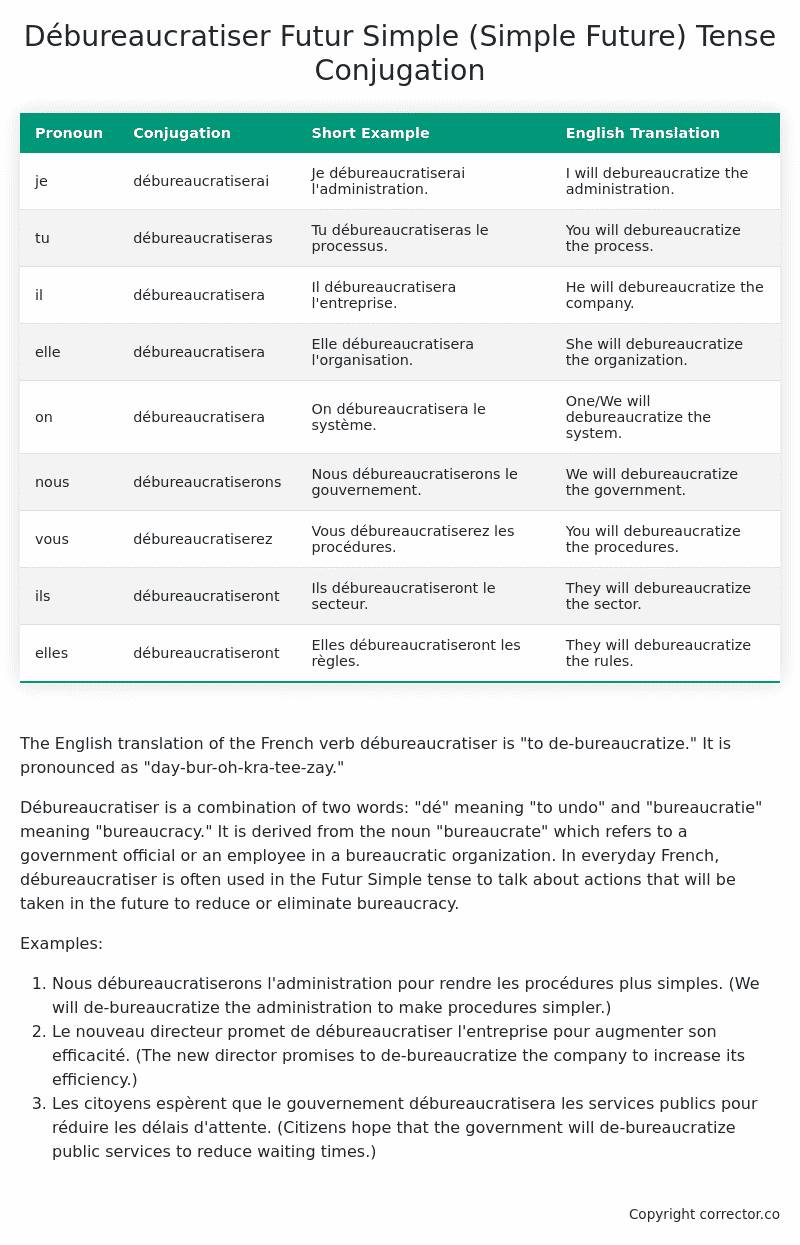Futur Simple (Simple Future) Tense Conjugation of the French Verb débureaucratiser
Introduction to the verb débureaucratiser
The English translation of the French verb débureaucratiser is “to de-bureaucratize.” It is pronounced as “day-bur-oh-kra-tee-zay.”
Débureaucratiser is a combination of two words: “dé” meaning “to undo” and “bureaucratie” meaning “bureaucracy.” It is derived from the noun “bureaucrate” which refers to a government official or an employee in a bureaucratic organization. In everyday French, débureaucratiser is often used in the Futur Simple tense to talk about actions that will be taken in the future to reduce or eliminate bureaucracy.
Examples:
- Nous débureaucratiserons l’administration pour rendre les procédures plus simples. (We will de-bureaucratize the administration to make procedures simpler.)
- Le nouveau directeur promet de débureaucratiser l’entreprise pour augmenter son efficacité. (The new director promises to de-bureaucratize the company to increase its efficiency.)
- Les citoyens espèrent que le gouvernement débureaucratisera les services publics pour réduire les délais d’attente. (Citizens hope that the government will de-bureaucratize public services to reduce waiting times.)
Table of the Futur Simple (Simple Future) Tense Conjugation of débureaucratiser
| Pronoun | Conjugation | Short Example | English Translation |
|---|---|---|---|
| je | débureaucratiserai | Je débureaucratiserai l’administration. | I will debureaucratize the administration. |
| tu | débureaucratiseras | Tu débureaucratiseras le processus. | You will debureaucratize the process. |
| il | débureaucratisera | Il débureaucratisera l’entreprise. | He will debureaucratize the company. |
| elle | débureaucratisera | Elle débureaucratisera l’organisation. | She will debureaucratize the organization. |
| on | débureaucratisera | On débureaucratisera le système. | One/We will debureaucratize the system. |
| nous | débureaucratiserons | Nous débureaucratiserons le gouvernement. | We will debureaucratize the government. |
| vous | débureaucratiserez | Vous débureaucratiserez les procédures. | You will debureaucratize the procedures. |
| ils | débureaucratiseront | Ils débureaucratiseront le secteur. | They will debureaucratize the sector. |
| elles | débureaucratiseront | Elles débureaucratiseront les règles. | They will debureaucratize the rules. |
Other Conjugations for Débureaucratiser.
Le Present (Present Tense) Conjugation of the French Verb débureaucratiser
Imparfait (Imperfect) Tense Conjugation of the French Verb débureaucratiser
Passé Simple (Simple Past) Tense Conjugation of the French Verb débureaucratiser
Passé Composé (Present Perfect) Tense Conjugation of the French Verb débureaucratiser
Futur Simple (Simple Future) Tense Conjugation of the French Verb débureaucratiser (this article)
Futur Proche (Near Future) Tense Conjugation of the French Verb débureaucratiser
Plus-que-parfait (Pluperfect) Tense Conjugation of the French Verb débureaucratiser
Passé Antérieur (Past Anterior) Tense Conjugation of the French Verb débureaucratiser
Futur Antérieur (Future Anterior) Tense Conjugation of the French Verb débureaucratiser
Subjonctif Présent (Subjunctive Present) Tense Conjugation of the French Verb débureaucratiser
Subjonctif Passé (Subjunctive Past) Tense Conjugation of the French Verb débureaucratiser
Subjonctif Imparfait (Subjunctive Imperfect) Tense Conjugation of the French Verb débureaucratiser
Conditionnel Présent (Conditional Present) Tense Conjugation of the French Verb débureaucratiser
Conditionnel Passé (Conditional Past) Tense Conjugation of the French Verb débureaucratiser
L’impératif Présent (Imperative Present) Tense Conjugation of the French Verb débureaucratiser
L’infinitif Présent (Infinitive Present) Tense Conjugation of the French Verb débureaucratiser
Struggling with French verbs or the language in general? Why not use our free French Grammar Checker – no registration required!
Get a FREE Download Study Sheet of this Conjugation 🔥
Simply right click the image below, click “save image” and get your free reference for the débureaucratiser Futur Simple tense conjugation!

Débureaucratiser – About the French Futur Simple (Simple Future) Tense
Formation of Futur Simple
For regular -er verbs (e.g., parler – to speak)
For regular -ir verbs (e.g., finir – to finish)
For regular -re verbs (e.g., vendre – to sell)
Common Everyday Usage Patterns
Conditional Statements
Interactions with Other Tenses
Futur Antérieur
Conditional
Present
Summary
I hope you enjoyed this article on the verb débureaucratiser. Still in a learning mood? Check out another TOTALLY random French verb conjugation!


